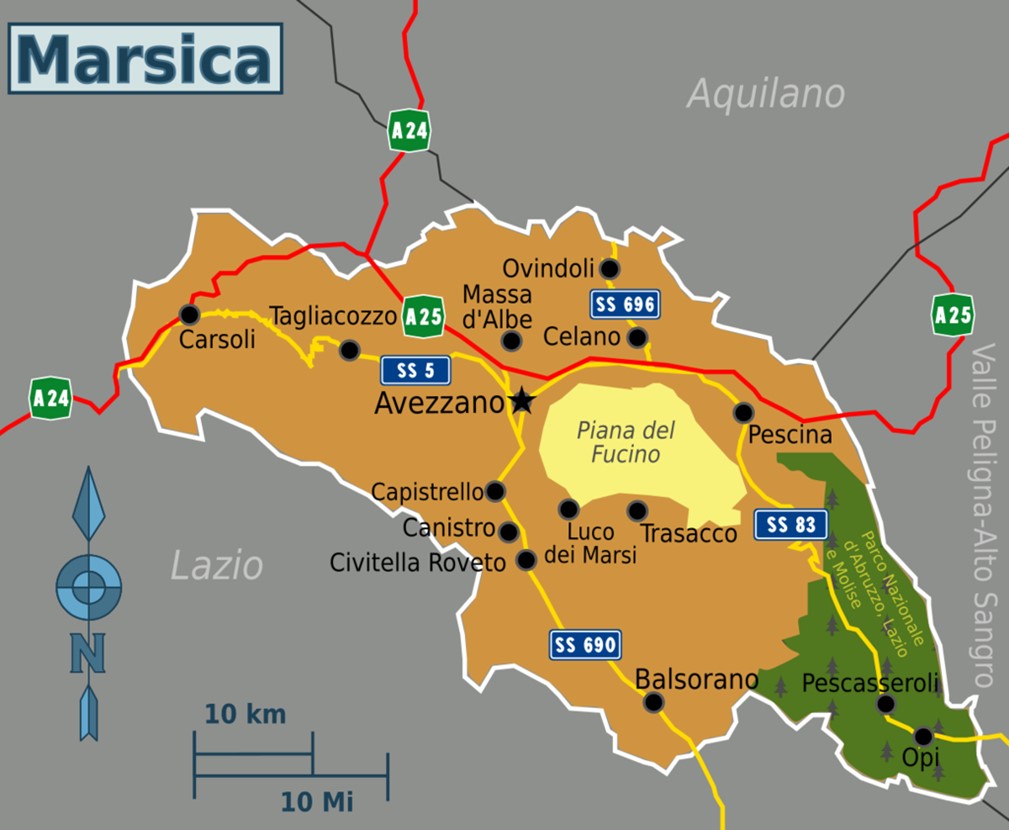Marsica is an ancient district in the province of L'Aquila whose 39 municipalities include Oricola dei Marsi, the native place of the curator of this site. Geographically, it is on the border between the province of L'Aquila and that of Rome, crossed by the ancient consular road Tiburtina-Valeria that connected Rome to the Adriatic coast near Pescara.
From a Catholic point of view, this district coincides with the diocese of the Marsi with Avezzano as its capital, where the episcopal curia is also located, and has always been rather important, so much so that since time immemorial and also for an evident geographical contiguity, its ordinary was a close collaborator of the bishop of Rome, the Roman pontiff, with the title of “Assistente al Soglio Pontificio” (Assistant to the Papal Throne). With the Pontificalis Domus reform of Paul VI in 1968, this title was abolished.
 As a result, over centuries this situation has led to a particularly rich concentration of churches, abbeys, convents, monasteries, hermitages and centres of religious spirituality, where a number of saints and blesseds have lived and worked, thus contributing to also shaping the character of the Marsicans. It is a truly unique wealth, largely favored also by the orography of the area, where its majestic mountains offer ideal settings for prayer, isolation, silence and meditation.
As a result, over centuries this situation has led to a particularly rich concentration of churches, abbeys, convents, monasteries, hermitages and centres of religious spirituality, where a number of saints and blesseds have lived and worked, thus contributing to also shaping the character of the Marsicans. It is a truly unique wealth, largely favored also by the orography of the area, where its majestic mountains offer ideal settings for prayer, isolation, silence and meditation.
Strangely enough this heritage, still somewhat unknown and unexplored, deserves to be brought to the attention of an ever wider public, not only local, regional and national, but also international, precisely because of the universal dimension of the Christian message, which here found ideal rooting opportunities, as evidenced by the great presence of these religious vestiges.
Now that he has returned and settled in his native place after the working years spent in Rome, the curator of this site with growing amazement is increasingly rediscovering these extraordinary treasures of faith, which he willingly offers to the attention of visitors to this site .
The Bishops-Assistant at the Pontifical Throne were ecclesiastical titles in the Roman Catholic Church. It designated prelates belonging to the Papal Chapel, who stood near the throne of the Pope at solemn functions. The title has not been in use since Pope Paul VI issued his "motu proprio" (Latin: Pontificalis Domus) on 28 March 1968, which reformed the Papal Court, renaming it the Papal Household and eliminated all previous titles of nobility. Unless specified otherwise, all Assistants at the Pontifical Throne immediately entered the Papal nobility as Counts of Rome. Assistants at the Pontifical Throne ranked immediately below the College of Cardinals and were also Counts of the Apostolic Palace.
On 22 May 1862, during the canonization ceremony of the twenty-six Catholic martyrs of Japan, Pope Pius IX elevated all the bishops present to the rank of Assistant at the Pontifical Throne. On 8 January 1866, Ruggero Luigi Emidio Antici Mattei was named Dean of the Assistants at the Pontifical Throne after Pope Pius IX named him Latin Patriarch of Constantinople. On 17 June 1867, during the 1800th anniversary of the martyrdom of Saints Peter and Paul, Pope Pius IX elevated all the bishops present to the rank of Assistant at the Pontifical Throne.
The title has not been in use since Pope Paul VI's reform of the Pontifical Household in 28 March 1968 which eliminated all previous titles of nobility.
Back to the news


 MARSICA AND SURROUNDINGS
MARSICA AND SURROUNDINGS